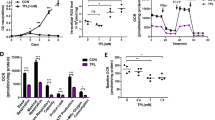Abstract
We have previously demonstrated that novel 1-alkyl-tryptophan analogs 1-butyltryptophan (1-BT) can serve as a potential antitumor agent. However, the molecular mechanisms of 1-BT on cancer cells remain to be elucidated. The effect of 1-BT on cell proliferation was detected by 3-[4,5-dimethylthiazol-2-yl]-2,5 diphenyl tetrazolium bromide (MTT) assay and clone formation assay in SGC7901 and AGS cells. Cell cycle was determined by flow cytometry. Cell migration and invasion was determined by wound healing assay and transwell assay. The expression of cyclin-dependent kinase 4 (CDK4), cyclin D1, p16, PCNA, phosphorylated Akt, total Akt, phosphorylated ERK1/2, and total ERK1/2 was examined using Western blotting. Our data demonstrated that 1-BT inhibited cell proliferation in a dose- and time-dependent manner by the downregulation of expression of cyclin D1 and CDK4 and by the upregulation of p16 expression. The inhibition of cell growth was also demonstrated by cell cycle arrest at the G1/S phase. Furthermore, 1-BT inhibited cell migration and invasion in SGC7901 cells. In addition, we found that phosphorylated Akt was suppressed in 1-BT treated SGC7901 cells. Overexpression of activated Akt reversed the effects of 1-BT on cell migration and invasion in SGC7901 cells. These results indicated that 1-BT inhibited gastric cancer cells proliferation and migration through the Akt pathway, which has the potential clinical significance in the prevention and treatment of gastric cancer.




Similar content being viewed by others
References
Melton SD, Genta RM, Souza RF. Biomarkers and molecular diagnosis of gastrointestinal and pancreatic neoplasms. Nat Rev. 2010;7:620–8.
Sethi S, Ali S, Philip PA, Sarkar FH. Clinical advances in molecular biomarkers for cancer diagnosis and therapy. Int J Mol Sci. 2013;14:14771–84.
Parkin DM, Bray FI, Devesa SS. Cancer burden in the year 2000. The global picture. Eur J Cancer. 2001;37 Suppl 8:S4–S66.
Parkin DM. International variation. Oncogene. 2004;23:6329–40.
Stewart ZA, Westfall MD, Pietenpol JA. Cell-cycle dysregulation and anticancer therapy. Trends Pharmacol Sci. 2003;24:139–45.
Pauwels B, Wouters A, Peeters M, Vermorken JB, Lardon F. Role of cell cycle perturbations in the combination therapy of chemotherapeutic agents and radiation. Fut Oncol (London, England). 2010;6:1485–96.
Kozar K, Sicinski P. Cell cycle progression without cyclin d-cdk4 and cyclin d-cdk6 complexes. Cell Cycle (Georgetown, Tex). 2005;4:388–91.
Sun T, Li ZL, Tian H, Wang SC, Cai J. Synthesis and biological evaluation of novel 1-alkyl-tryptophan analogs as potential antitumor agents. Molecules (Basel, Switzerland). 2009;14:5339–48.
Zhang ZY, Ge HY. Micrometastasis in gastric cancer. Cancer Lett. 2013;336:34–45.
Matsuoka T, Yashiro M. The role of pi3k/akt/mtor signaling in gastric carcinoma. Cancers. 2014;6:1441–63.
Sun T, Chen XH, Tang ZD, Cai J, Wang XY, Wang SC, et al. Novel 1-alkyl-tryptophan derivatives downregulate ido1 and ido2 mrna expression induced by interferon-gamma in dendritic cells. Mol Cell Biochem. 2010;342:29–34.
Sun T, Tian H, Feng YG, Zhu YQ, Zhang WQ. Egr-1 promotes cell proliferation and invasion by increasing beta-catenin expression in gastric cancer. Dig Dis Sci. 2013;58:423–30.
Kishimoto I, Mitomi H, Ohkura Y, Kanazawa H, Fukui N, Watanabe M. Abnormal expression of p16(ink4a), cyclin d1, cyclin-dependent kinase 4 and retinoblastoma protein in gastric carcinomas. J Surg Oncol. 2008;98:60–6.
Katayama H, Brinkley WR, Sen S. The aurora kinases: role in cell transformation and tumorigenesis. Cancer Metastasis Rev. 2003;22:451–64.
Juhasz C, Muzik O, Lu X, Jahania MS, Soubani AO, Khalaf M, et al. Quantification of tryptophan transport and metabolism in lung tumors using pet. J Nucl Med. 2009;50:356–63.
Larue L, Bellacosa A. Epithelial-mesenchymal transition in development and cancer: role of phosphatidylinositol 3′ kinase/akt pathways. Oncogene. 2005;24:7443–54.
Qiao M, Sheng S, Pardee AB. Metastasis and akt activation. Cell Cycle (Georgetown Tex). 2008;7:2991–6.
Matsuoka T, Yashiro M, Nishioka N, Hirakawa K, Olden K, Roberts JD. Pi3k/akt signalling is required for the attachment and spreading, and growth in vivo of metastatic scirrhous gastric carcinoma. Br J Cancer. 2012;106:1535–42.
Chen X, Ye S, Xiao W, Wang W, Luo L, Liu Y. Erk1/2 pathway mediates epithelial-mesenchymal transition by cross-interacting with tgfbeta/smad and jagged/notch signaling pathways in lens epithelial cells. Int J Mol Med. 2014;33:1664–70.
Ogasawara N, Oguro T, Sakabe T, Matsushima M, Takikawa O, Isobe K, et al. Hemoglobin induces the expression of indoleamine 2,3-dioxygenase in dendritic cells through the activation of pi3k, pkc, and nf-kappab and the generation of reactive oxygen species. J Cell Biochem. 2009;108:716–25.
Koorella C, Nair JR, Murray ME, Carlson LM, Watkins SK, Lee KP. Novel regulation of cd80/cd86-induced phosphatidylinositol 3-kinase signaling by notch1 protein in interleukin-6 and indoleamine 2,3-dioxygenase production by dendritic cells. J Biol Chem. 2014;289:7747–62.
Tanizaki Y, Kobayashi A, Toujima S, Shiro M, Mizoguchi M, Mabuchi Y, et al. Indoleamine 2,3-dioxygenase promotes peritoneal metastasis of ovarian cancer by inducing an immunosuppressive environment. Cancer Sci. 2014;105(8):966–73.
Brandacher G, Perathoner A, Ladurner R, Schneeberger S, Obrist P, Winkler C, et al. Prognostic value of indoleamine 2,3-dioxygenase expression in colorectal cancer: effect on tumor-infiltrating t cells. Clin Cancer Res. 2006;12:1144–51.
Acknowledgments
This work was supported by grants from the National Natural Science Foundation of China (81201116).
Conflicts of interest
None
Author information
Authors and Affiliations
Corresponding authors
Electronic supplementary material
Below is the link to the electronic supplementary material.
Supplemental figure 1
(JPEG 52 kb)
Supplemental figure 2
(JPEG 185 kb)
Rights and permissions
About this article
Cite this article
Sun, T., Tian, H. & Xin, Y. 1-butyltryptophan inhibits cell proliferation, migration, and invasion through the Akt pathway in human gastric cancer cells. Tumor Biol. 36, 2517–2522 (2015). https://doi.org/10.1007/s13277-014-2865-1
Received:
Accepted:
Published:
Issue Date:
DOI: https://doi.org/10.1007/s13277-014-2865-1




